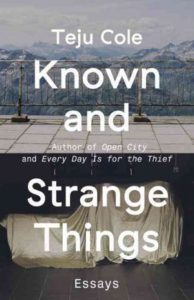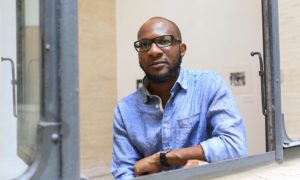 I’ve been reading Tẹjú Cole’s Known and Strange Things among other commitments. The book is a collection of published and unpublished essays by the acclaimed author of Open City and Everyday is for the Thief, two books noted for their essay-like forms that brilliantly blur the lines between travel writing and fiction. As a travel blogger, I can relate. He also follows in the tradition of many other writers famous for documenting their travel adventures in their literary output. The book is a compact curation of his own writing journey from many publications in which a number of them had first appeared.
I’ve been reading Tẹjú Cole’s Known and Strange Things among other commitments. The book is a collection of published and unpublished essays by the acclaimed author of Open City and Everyday is for the Thief, two books noted for their essay-like forms that brilliantly blur the lines between travel writing and fiction. As a travel blogger, I can relate. He also follows in the tradition of many other writers famous for documenting their travel adventures in their literary output. The book is a compact curation of his own writing journey from many publications in which a number of them had first appeared.
In one of the essays in the book, Cole famously follows James Baldwin to a city in Switzerland in order to re-live that writer’s experience in the sixties while he was working on Go Tell it on the Mountain and to reflect on what may have changed over the course of time. In another, he documents his meeting with V.S. Naipaul in New York, being awed by him but not too much as not to be aware of the man’s occasional condescension that comes out at unexpected moments. “He speaks so well,” Naipaul says of the African author and we glimpse from the skill of retelling that it wasn’t that much of a compliment. In An African Caesar, the author does a nuanced review of a theatre presentation by the Royal Shakespeare Company at the Brooklyn Academy of Music, but doing it against the background of other ironies and coincidences riding on the lives of Shakespeare, Caesar, Abraham Lincoln, and the all-black cast.
In the preface, Cole pays homage to one of his (and my) favourite tongue-twisters from Yorùbá (“Ọ̀pọ̀lọpọ̀ ọ̀pọ̀lọ́ ni kò mọ̀ pé ọ̀pọ̀lọpọ̀ ènìyàn l’ọ́pọlọ l’ọ́pọ̀lọpọ̀”) to illustrate his rootedness in his home culture properly balanced with his accommodation of other cultures and values. In another part of the chapter he expounds this more clearly:
“There’s no world in which I would surrender the intimidating beauty of Yoruba-language poetry for, say, Shakespeare’s sonnets, or one in which I’d prefer chamber orchestras playing baroque music to the koras of Mali. I’m happy to own all of it. This carefree confidence is, in part, the gift of time… I feel little alienation in museums, full though they are of other people’s ancestors… I am not an interloper when I look at a Rembrandt portrait. I care for them more than some white people do, just as some white people care more for aspects of African art than I do…”
The tongue-twister was, impressively, left un-italicized as have typically been the case in most books published abroad. It was, however, not properly tone-marked as Yorùbá words usually ought, and as I did above. Neither were any Yorùbá names referenced in the work. My initial assumption is that this is the publisher’s error, typically paying less attention to proper diacritical marking on non-English words. But elsewhere in the book (Furtwängler, Tété-Michel Kpomassie, Florian Höllerer, Tomas Tranströmer, Galápagos, etc) names belonging to other people in accented/tonal languages were properly accented with no eyebrows raised. Here, my initial elation at the central featuring of Yorùbá in this work was greatly punctured, and now awaiting sacrificial appeasement and repair. In 2016, we should no longer be apologetic about insisting on proper writing of African languages in literature. The writer, certainly, at this height of his literary career, stands in a great position to influence this change.
 My favourite essay in the work yet is an essay titled Unnamed Lake which is a stream-of-consciousness-type narrative on the complexity of perception, art, and the role of memory. It is one I’ll also read again for its layered presentation that offers new gem each time. I like it also for its use of mixed metaphors from French/Algeria (Derrida) to Germany (Wilhelm Furtwängler), from Australia (the Adnyamathanha people) to Nigeria (Major Patrirck Chukwuman Kaduna Nzeogwu), from Bangladesh to Hiroshima (President Truman). The other essays more grounded in recognizable reality of the author’s work history: reviews (Wangechi Mutu), polemics (The White Saviour Industrial Complex), satire (In Place of Thought), and interview (A Conversation with Aleksandar Hemon), etc, are equally enchanting, and serve a purpose of providing a wide appraisal of Teju Cole’s worldview.
My favourite essay in the work yet is an essay titled Unnamed Lake which is a stream-of-consciousness-type narrative on the complexity of perception, art, and the role of memory. It is one I’ll also read again for its layered presentation that offers new gem each time. I like it also for its use of mixed metaphors from French/Algeria (Derrida) to Germany (Wilhelm Furtwängler), from Australia (the Adnyamathanha people) to Nigeria (Major Patrirck Chukwuman Kaduna Nzeogwu), from Bangladesh to Hiroshima (President Truman). The other essays more grounded in recognizable reality of the author’s work history: reviews (Wangechi Mutu), polemics (The White Saviour Industrial Complex), satire (In Place of Thought), and interview (A Conversation with Aleksandar Hemon), etc, are equally enchanting, and serve a purpose of providing a wide appraisal of Teju Cole’s worldview.
What are essays good for? Setting an agenda, making a point, codifying for a coming generation thoughts, ideas, arguments, and questions plaguing a specific time? Mr. Cole’s collection touch on many of these as a timely intervention not just for identifying his own outlook on the world – though this is relevant – but also for leaving a mark identifying this place and this time as his point of visiting. Like a traveler in the desert on the way to somewhere else choosing for a while to make artistry from the sand under his feet not only to delight himself (and how discomfiting would that be in a scorching desert?) but also to amaze overhead flyers and future visitors to the place with his own creative interpretation of what he had experienced.
In that way, essays are not that different from memoirs, which tap into memory and creative writing to attempt an understanding of the past through the narrative lens, except that they tell more than they show, opening to us directly the thoughts and opinions of the writer. What we take away is more than knowledge of the subjects and places we walked through with the writer, but also something about the writer himself. Known and Strange Things tell us that the brilliant Teju Cole is curious in his approach to life, attentive things that connect us with those who have gone before, of different colors, cultures and tongues, and diligent in his retelling of (or at least his arguments about) what makes them memorable or relevant, allowing us to walk in his shoes page by page. That makes the book an engaging, and important, read.
____
Photo credit: TheGuardian.com
3 Comments to A Diligent Retelling: Reading Teju Cole’s Essay Collection so far. (RSS Feeds for comments in this post)